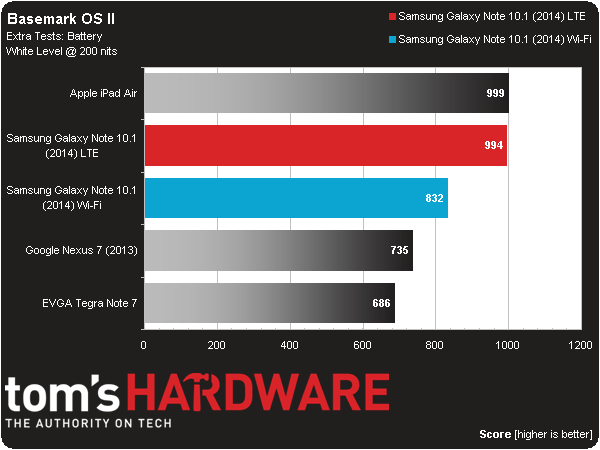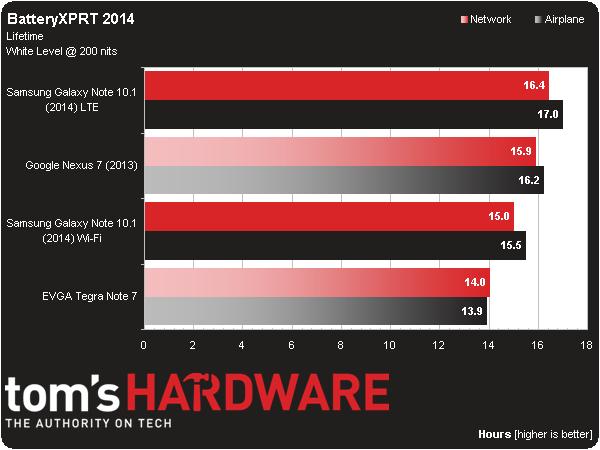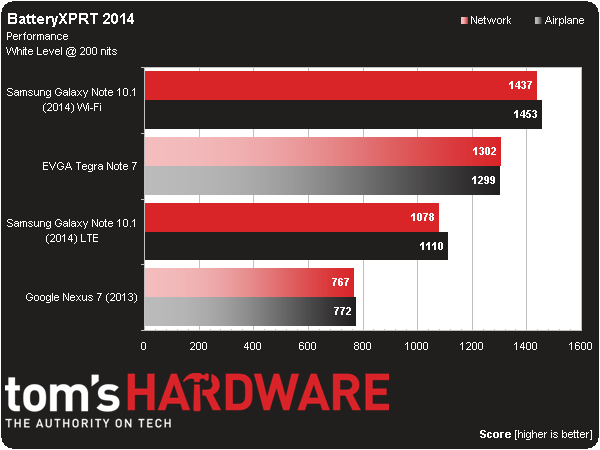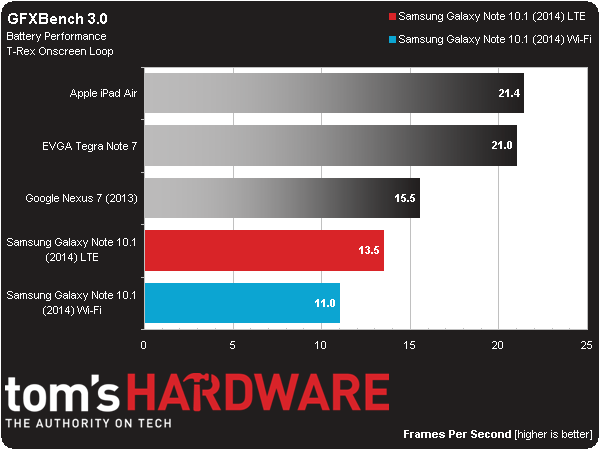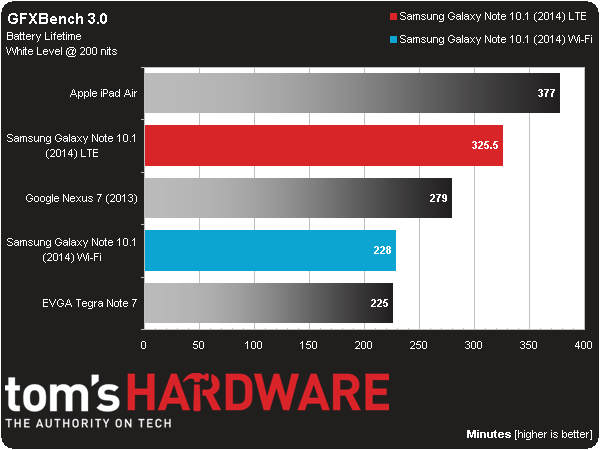Samsung Galaxy Note 10.1 (2014 Edition) Review: Wi-Fi Vs. LTE
Today's review of Samsung's Galaxy Note 10.1 (2014 Edition) includes the LTE-capable and Wi-Fi-only tablets, allowing us to compare Samsung's own Exynos 5 Octa platform to Qualcomm's Snapdragon 800. Can either configuration usurp Apple's iPad Air?
Why you can trust Tom's Hardware
Results: Battery Life
Sporting a hefty 8220 mAh battery—a significant 1000+ mAh upgrade over previous Galaxy Note/Tab 10.1 offerings—on paper, the Note 10.1 2014 should perform solidly in our battery life tests. Based on personal use, though, which includes two synced Gmail accounts, some light gaming, lots of browsing, and some YouTube viewing, I can say that the Note 10.1 2014 easily lasts a day and a half to two days.
Let's see how our battery benchmarks rate the Note 10.1 2014 compared with other popular devices.
Basemark OS II
The Basemark OS II battery test scores are derived by repeatedly running the devices until enough data has been collected to determine the drain rate of the device.
Apple's iPad Air scores the best by a slight margin, followed by the two Samsung Galaxy Note 10.1 (2014 Edition) tablets. Surprisingly, the LTE version does better than the Wi-Fi version in this test. Since we know they have the same battery and display, we suspect the difference comes down to Qualcomm's SoC versus Samsung's. It should be noted that the LTE model had cellular data disabled for testing, and the cellular component of the Snapdragon 800 would add to the LTE model's power usage. An active LTE connection would likely reverse the scores.
BatteryXPRT 2014
BatteryXPRT 2014 is a specialized battery testing application for Android devices that provides users with an "expected" Lifetime score, as well as an overall Performance score. The test has two variations: Network-Connected and Airplane Mode.
At the time of this testing, the stable version of BatteryXPRT 2014 had not yet been released, so these scores are taken from the final Community Preview.
In BatteryXPRT 2014, we get a demonstration of the Snapdragon 800's power efficiency versus the Exynos 5 Octa, with a whopping 16+ hours on the Snapdragon 800 version versus 15+ hours on the Exynos model.
Get Tom's Hardware's best news and in-depth reviews, straight to your inbox.
In terms of performance, the Wi-Fi Note 10.1 does much better than its LTE counterpart, also beating the rest of the competition.
GFXBench 3.0
GFXBench's battery test measures battery life and performance stability by logging frame and battery discharge rate as the on-screen T-Rex test runs for 30 consecutive iterations. The results are given in two scores: estimated battery life in minutes, and the number of frames rendered on the slowest test run (to gauge if a device is throttling). Both tests are run at the device's 50-percent brightness level in the free Community Edition, while the paid Corporate Edition can be set to 0 percent, 25 percent, 75 percent, 100 percent, or whatever the device's native slider is set to. We very specifically calibrate all units to 200 nits before doing any battery testing.
On GFXBench 3.0, the Note 10.1 (2014 Edition) LTE does slightly better than the Wi-Fi model in terms of battery performance, but neither model show any sign of throttling, as the lowest scores of the 30-iteration run match the single-run scores.
The Snapdragon 800 is a good performer when it comes to battery efficiency, while the big.LITTLE configuration of the Exynos 5 Octa isn't far behind. With that said, all of the Android-based tablets fall short of the iPad Air's exemplary performance.
Current page: Results: Battery Life
Prev Page Brightness, Black Level, Contrast Ratio, And Gamma Next Page Galaxy Note 10.1 (2014) Wi-Fi Or LTE?-
blackmagnum The only possible way Samsung mobile devices can be a worthwhile alternative to Apple is when they ditch the every-man Android and create their own tightly controlled/ managed OS like Apple. Do that and consumers might not feel like they're just buying the Samsung for the hardware.Reply -
Farrwalker On page 7. Results: CPU Core Benchmarks:Reply
Your bar graph "MobileXPRT 2013" seems to be in error.
For example, the text says, "Note 10.1 (2014 Edition) Wi-Fi leads with 300 points . . ."
but the bar is the shortest and indicates less than 150 points.
-
blueer03 You need to proofread this big time. From page 9:Reply
Samsung's Exynos-based Note 10.1 (2014 Edition) Wi-Fi holds its own against the Tegra Note 7, while the LTE version of the Note 10.1 (2014 Edition) again falls significantly behind its Snapdragon 800-powered Wi-Fi counterpart.
And this happens all throughout. The LTE is a Snapdragon, the Wifi is an Exynos. Keep repeating that to yourself as you re-write the descriptions and it will make this easier to read. -
Kevin Harrelson We got one of these for my son (age 13) to help with his school work. We got it from Best Buy and got the extended warranty. Both sound dumb, but it was actually a good move! The backlight has gone out on this thing TWICE. I happen to think that it is a lovely little tablet, but the backlight is a major reliability issue.Reply -
adamovera ReplyOn page 7. Results: CPU Core Benchmarks:
This benchmark's sub-tests produce scores in seconds (lower is better), and the overall score is given as a typical higher-is-better score, so the lowest bar indicates the fastest completion. Sorry about the confusion, I'll look into other ways to represent this test.
Your bar graph "MobileXPRT 2013" seems to be in error. For example, the text says, "Note 10.1 (2014 Edition) Wi-Fi leads with 300 points . . ." but the bar is the shortest and indicates less than 150 points.
-
adamovera ReplyYou need to proofread this big time. From page 9:
Good catch, thanks! Fixed.
Samsung's Exynos-based Note 10.1 (2014 Edition) Wi-Fi holds its own against the Tegra Note 7, while the LTE version of the Note 10.1 (2014 Edition) again falls significantly behind its Snapdragon 800-powered Wi-Fi counterpart.
And this happens all throughout. The LTE is a Snapdragon, the Wifi is an Exynos. Keep repeating that to yourself as you re-write the descriptions and it will make this easier to read. -
Tomtompiper The 2014 is almost 5 months old and has been superseded by the Amoled screened Galaxy Tab S 10.1 which wipes the floor with the opposition. http://www.gsmarena.com/samsung_galaxy_tab_s_105-review-1097.php Do try to keep up!Reply -
adamovera ReplyThe 2014 is almost 5 months old and has been superseded by the Amoled screened Galaxy Tab S 10.1 which wipes the floor with the opposition. http://www.gsmarena.com/samsung_galaxy_tab_s_105-review-1097.php Do try to keep up!
Actually, you'd think this has been phased out, but it's the current 10-inch Galaxy "Note" product, meaning it has the S Pen. The Galaxy "Tab" S does not - still unclear to me what makes the "S" stand out. I believe Samsung is literally attempting to offer an alternative product to every single other device in existence - complete mobile domination. I lost count of their current "Galaxy" line at 11 products, and that was awhile back.
The duo of Note 10.1 (2014)'s came in very handy both as comparison data in other articles and as testbeds for compiling our benchmark suite. Unfortunately, the article had to be pushed back several times, but the huge hardware difference between products carrying the same name was always something we wanted to illustrate, initially for the chipset-vs-chipset angle, but later for the optimization aspect as well. We're currently working through a small backlog of mobility articles, but each will be more timely than the last. My apologies. -
Blazer1985 I really wish Samsung could help the end user distinguish what they are buying. The 2 Note are classified as "LTE" and "WIFI ONLY" which sounds like 2 equal devices except for the sim card slot while they actually have a totally different soc.Reply -
vaughn2k ... and Samsung prices are now on par with Apple's. others are okay. Will wait for Asus and other competition. Should be cheaper though...Reply
